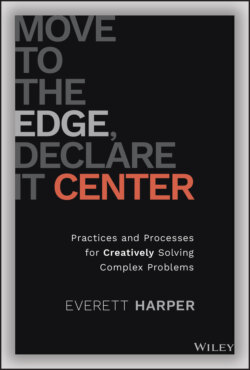Читать книгу Move to the Edge, Declare it Center - Everett Harper - Страница 8
ОглавлениеPreface
July 7, 2016: Stand Up, Speak Up
I was reading a post by Ellen McGirt,1 senior editor at Fortune magazine, called, “Why Employers Need to Talk about Shootings of Black People,”2 after 24 hours of drifting in waves of despair about the murders of Alton Sterling and Philando Castile. Her article highlighted the need for employers to go beyond the idea of inclusion to the more resonant emotion of compassion. She argued that when two Black men are killed by police, one at a traffic stop in front of his four‐year‐old daughter, employers must recognize that their employees, like much of the rest of the country, are likely to be deeply affected. I nodded my head with her clear, fierce, call to employers to go beyond their comfort zone.
And then I realized: “I'm the employer.”
I'm the CEO of Truss, a highly diverse, remote‐first software development company. My cofounders and I worked hard to make our company inclusive, using “radical candor”3 to address issues that many companies avoid. But news of these murders required more of me. First, as a Black man, I felt unmoored and vulnerable. There is no sign on my car nor a logo on my jacket that reads, “Don't shoot, I'm a CEO.” At the same time, part of my job as a CEO is to set a foundation so our employees can continue to do great work. My silence would be turning away from that responsibility. I needed to write a speech that acknowledged that while I'm a leader … I'm also a target.
This is what I wrote that afternoon to the Trussels, our employees.
Many of my friends are “calling in Black today.” Much respect. For those who can't or who choose not to, it's a hard, hard day to grapple with two police murders of Black men while still maintaining our professional demeanor and standards of excellence. (Note: We do that every day. Today is harder.)
If you have a work colleague who is Black, or who is connected deeply to these shootings, please read Ellen's article. We're all “whole people,” and understanding how trauma affects work can make this a better company for everyone.
We can't have the benefits of a diverse and vibrant company without acknowledging when it gets hard. Today is one of those days for me, and “as an employer,” it feels awkward, challenging – and necessary – to address it. Personally, I'm exhausted, so I'm not up for engaging in conversation. But I can create a tone and a space where Trussels can engage without fear of reprisal, toxicity, or indifference.
Let it be so. However you choose to engage, at minimum read Ellen's article, take a moment to reflect, and take care of each other.
This was one a moment when I moved to my edge, when I had to step into the unknown, feeling uncertain, and decide how to address a complex issue. I suspect you have encountered this moment too, like the other leaders you will read about in this book. What you will learn is how to stand up, speak up, and move forward anyway. You will learn how to practice, so when the moment comes, you are centered and ready to provide the leadership your team, company and our communities need.
Notes
1 1. Ellen McGirt's Race Ahead newsletter for Forbes is a consistent, prolific (nearly daily) resource for the intersection of business, race, and culture filtered with her keen journalist's eye.
2 2. Ellen McGirt, Why Employers Need to Talk about the Police Shootings of Black People, Fortune, July 7, 2016.
3 3. Kim Scott, Radical Candor (St. Martin's Press, 2019).
